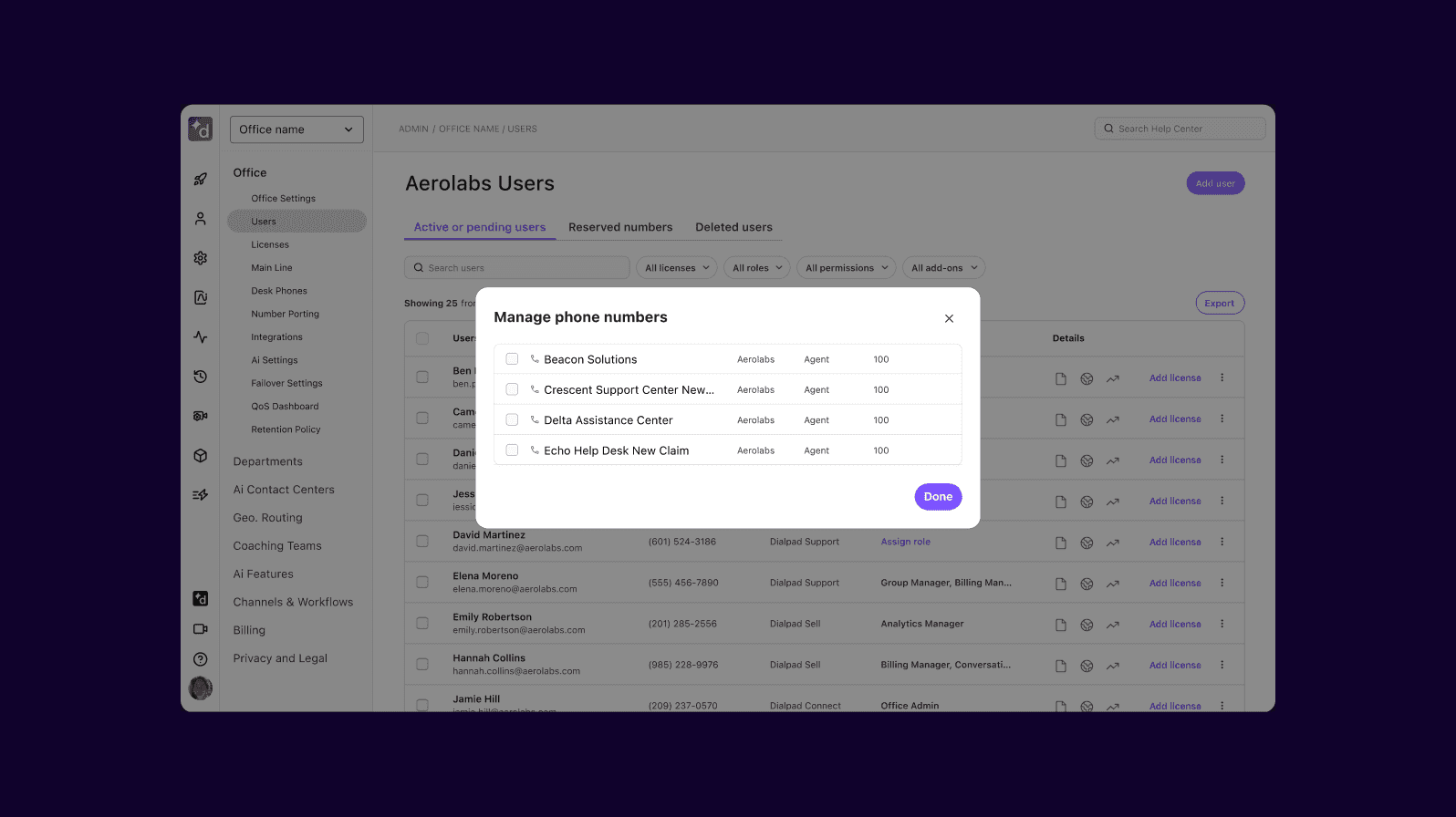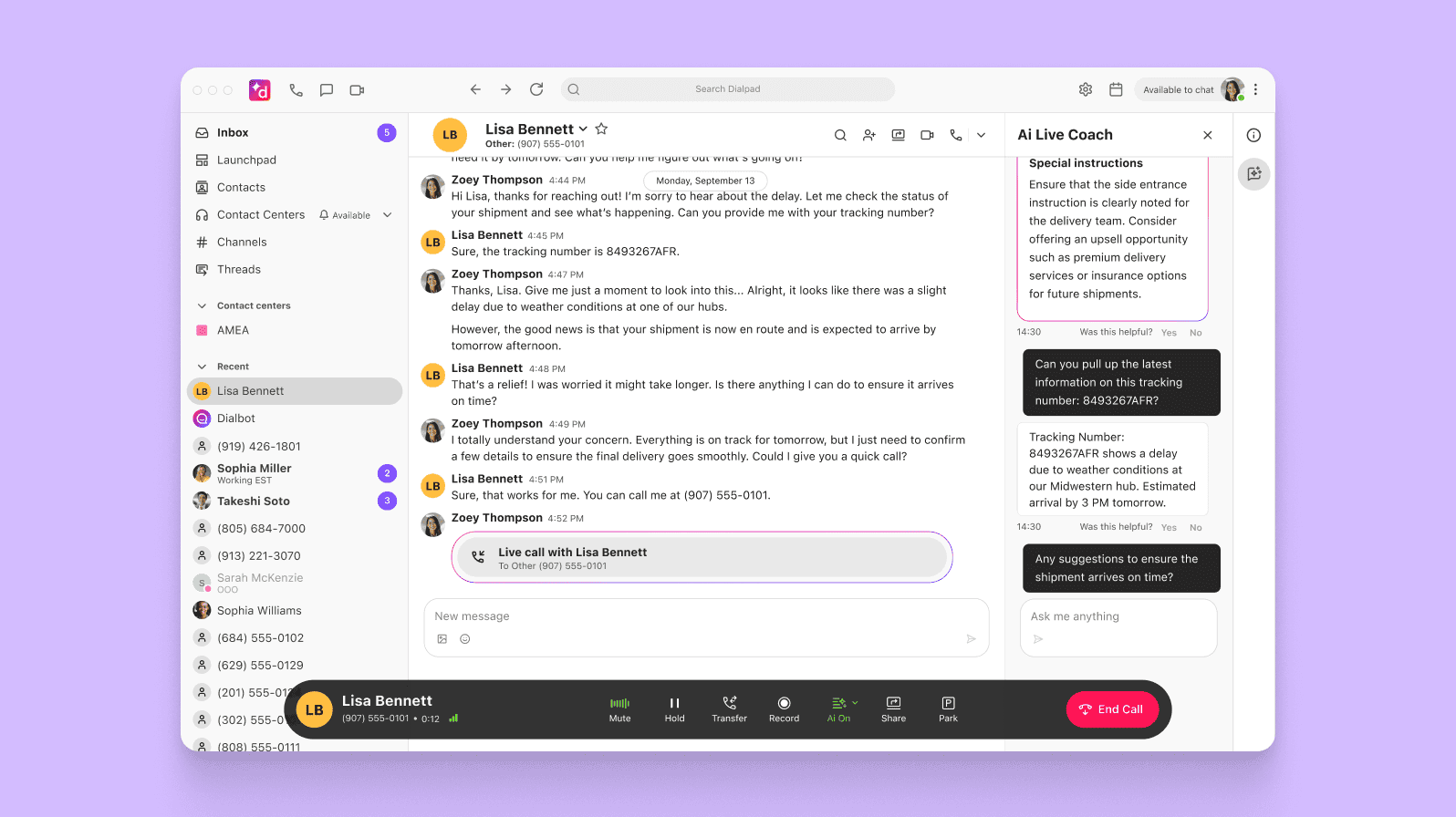Hosted contact centre
Looking for a contact centre solution? Dialpad's cloud contact centre platform is scalable, easy to use, and flexible. Book a product tour to see how it works!

A modern contact centre is designed to be agile and efficient. But what is the best call centre software architecture to achieve this?
That’s exactly what we’re going to be talking about. Hosted contact centre solutions have proven popular in recent years thanks to their relative affordability and ease of deployment when compared to traditional on-premises contact centre solutions.
But what if we told you there could be something even better?
We’re catapulting all of that tedious contact centre hardware into the ether. Because up in the skies there’s a browser-accessible communication platform that’s changing the way our contact centres work, for good.
Both outbound and inbound contact centres are today accessing synchronicity via the cloud.
Cloud service providers like Dialpad are now offering AI-powered, very flexible contact centre solutions with reduced operational costs and instant scalability that can be implemented in minutes.
What exactly is hosted contact centre software?
In a hosted contact centre, your contact centre software isn’t installed on-premises. Instead, it’s installed and hosted on a remote off-site server provided by an industry solution provider.
Typically hosted contact centres are referred to as “single-tenant,” whilst cloud contact centres are “multi-tenant.” We’ll get more into this later.
As a user, all you have to do to manage the contact centre is connect to the remote server over a network connection. In recent years, this was a popular option for startups and businesses looking to update their legacy hardware.
But, contact centre technology has come a long way since then, and hosted call centre software still lacks agility and flexibility in a few ways. (More on that in just a bit.)
If you’ve come across the term “CCaaS” (Contact Centre as a Service), that typically refers to cloud contact centres—not hosted contact centre software—so make sure not to confuse the two! (Most contact centre vendors today are cloud-based.)
Why have hosted contact centre solutions become an outdated option for businesses today?
Even though hosted contact centre solutions are a step up from maintaining traditional on-premises systems, they’re still not quite as good as cloud contact centres.
Quick note: Some people use “hosted” and “cloud” contact centre solutions interchangeably, but we’re referring to hosted contact centre solutions here as a step up from on-site, but not exactly cloud solutions. They do require less maintenance than a traditional on-premises server because that’s handled by your service provider, which makes them more affordable. But to be honest, that’s a pretty low bar considering how exorbitant the prices of on-premises contact centres can be.

What’s more, cloud contact centres are easy to set up and very cost-effective. The initial capital outlay is relatively low and most operational costs are absorbed by the provider.
Ultimately, this means that you can focus on things like providing great customer service, managing your team and generally running your business.
✒️ Vetting different contact centre solutions?
This RFP checklist covers the essentials to be aware of and why they may be important for your contact centre.
Things to consider if you’re thinking of a hosted contact centre
1. Not all hosted contact centres are easily scalable
Although hosted contact centres are a step up from on-premises solutions, they’re not all equally scaleable compared to true cloud-based alternatives. This is important because contact centres, especially those in industries with lots of seasonal fluctuations, may need to quickly scale up—or down—their capabilities, call capacity, and number of agents.
2. Hosted contact centres costs (usually more than true cloud solutions)
Again, if you’re comparing hosted contact centres to on-premises options, you’d be saving, because the service provider is maintaining their data centre, equipment, and connections, so you don’t have to.
But you’re not saving as much as you would with cloud contact centre software. One of the biggest benefits of going with the cloud is that it eliminates any aspect of the data centre management—including the people and expenses required.
3. The amount of control you want
As we mentioned earlier, a hosted approach could give you maximum control over your implementation of the software and isolate your data, allowing you to do things like implement special behaviour or code customisations of your own design (although this does make it harder to maintain and upgrade a system over time because it differs from a standard implementation).

A better alternative to hosted contact centre services: Cloud contact centres
Cloud contact centre services are a step up from their hosted counterparts and offer the best alternative to traditional on-premises hardware and phone systems.
So why exactly is a cloud contact centre better?
A cloud contact centre is a solution that facilitates processing, data, and all of the call handling logic online. Because of that, cloud contact centres are incredibly flexible and scalable.
A cloud contact centre can be accessed from anywhere, on any desktop or mobile device connected to the Internet. In the office, at home, on the road—you name it. As long as you have an internet connection, you can interact with your contact centre as an agent or as a manager, wherever you go.
Because of this, businesses with cloud-based contact centre solutions are able to cut back on their physical office space, computing and telephony infrastructure, saving time and money on everything from equipment to utility bills.
After all, with agents able to work remotely, there’s no need for so large of a footprint on the ground. Plus, since most cloud services work on a subscription-based pricing model, there’s zero upfront capital investment required.
The big benefit of the cloud is that it offers instant flexibility. You can scale up—or down—much more quickly with a cloud contact centre compared to a hosted or on-premises contact centre.
Other benefits of going with a cloud contact centre:
You can deploy new
and groups of agents in just minutes or days (not months)
Easier scalability to add phone lines, people, and support queues anywhere in the world.

You have access from anywhere—great for establishing a virtual call centre in another location or to meet sudden demand.
No expensive setup costs for facilities or hosting technology.
Lower operational costs (and total cost of ownership) since everything happens faster, and managers have visibility into contact centre operations and people around the world.
Zero maintenance, with automatic upgrades provided by the software vendor and applied instantly to all users of the contact centre software.
System, data, and network security provided as part of the service.
Reduced downtime, with automatic failover and low latency connections.
All of this allows you and your agents to focus on the valuable work: facilitating customer interactions and improving the customer experience—not the administration and maintenance of your tools.
When you’re choosing a cloud contact centre platform, look for features that can help you improve customer satisfaction and also your agents’ workflows.
For example: real-time support for your agents and managers, configurable IVR (interactive voice response) and other customer self-service options, ACD (automatic call distribution), agent skills-based and intelligent call routing, customer callback capabilities (when no agent is available), an automated outbound dialler, and both screen and voice call recording.
Looking for a contact centre solution?
See how Dialpad's contact centre platform is fully integrated with its unified communications product! Check it out in action with a demo, or take a self-guided interactive tour of the app on your own!
